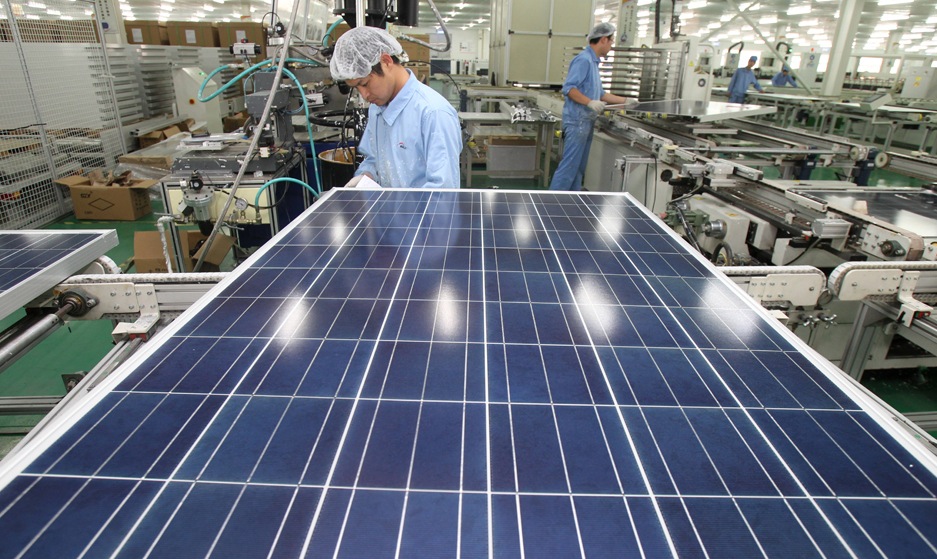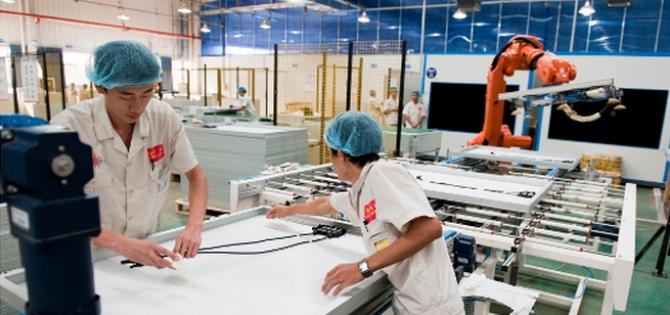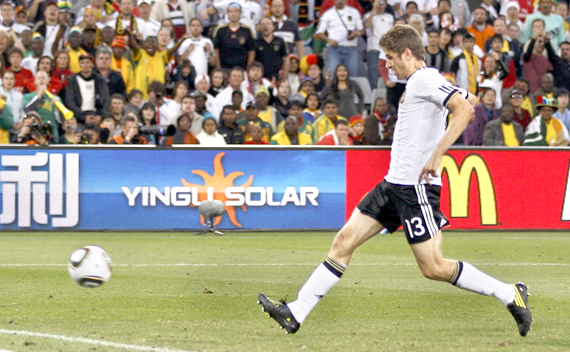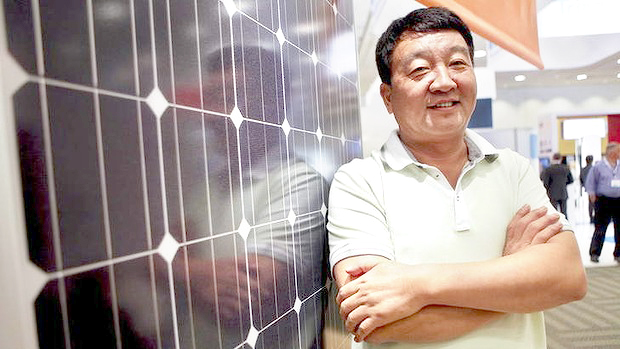China Solar Panel Factory
Go Inside the Factory That Makes the World’s Solar Panels
While you’re watching the final game of the World Cup today, keep a keen eye on the advertisements along the sidelines. You’re likely to see the name Yingli Solar: a massive Chinese solar power manufacturer that few soccer fans are likely to know. Sponsors typically fork out $50 to $100 million to put their names on display at this event. Climate Desk recently visited Yingli’s sprawling plant, and got a first-hand look at the booming company.
Founded in 1998, Yingli quickly grew into a global company with an IPO in 2007. Yet most people haven’t ever heard of it—which is exactly why the company is spending millions to get its name on billions of TVs across the world today.
World’s Largest Solar Panel Factory
Yingli Solar said they are so successful that their production capacity and value doubled every year from 2004 to 2013. Yingli’s staff count stands at a whopping 30,000 members, according to Zhao Zelin, the Global Sales Director of Yingli. That is 30,000 green jobs helping to carry the economy forward!
Yingli Solar is based in Baoding, which is currently facing particularly high levels of smog, which the video host found ironic. However, one drop can cause an enormous ripple. Yingli Solar could be considered that drop, as they are successfully providing more and more smog-reducing solar panels. The success of the solar industry will surely help Baoding to reduce their smog levels in the future.
Source: Nicholas Brown / clean technica
===================
China’s quiet achiever makes mark on energy’s new frontier
As China’s solar tycoons go, “Sun king” Shi Zhengrong and Miao Liansheng occupy different ends of the spectrum.
In 2007, Shi’s Suntech Power became the first Chinese solar energy company to list on the New York Stock Exchange. Its value rocketed to $US16 billion, valuing the Australian-trained solar engineer about $US3 billion at the stock’s peak.
Shi, 50, remains well-regarded as a scientist even if the company’s debt default this year has all but obliterated his wealth. Chinese authorities continue to work on a possible rescue of the company while legal action against Shi remains a possibility.
Miao, 57, is much less famous outside China, though perhaps not for much longer.
His company, Yingli Green Energy, has knocked Suntech off its rank as the world’s biggest producer of solar photovoltaic panels and its breakneck growth – along with an array of other Chinese firms – has driven PV prices down by about three-quarters in four years.
“He’s China’s Richard Branson,” said Daman Cole, commercial director of Yingli Solar, speaking of his boss at the opening of the company’s Australian office this week in Sydney.
To be sure, the British billionaire’s preference for media stunts does not appear to feature in Miao’s playbook. Inside China, the media highlights Suntech’s Western management approach while Yingli embodies the Chinese way of business. While Shi was devoting years in the lab for his PhD, Miao spent 15 years in the Chinese military.
Miao’s first business foray was hawking cosmetics before he branched out into organic vegetables and low-alkaline water. Not just street savvy, Miao also picked up a bachelor’s degree in business management and then an MBA from prestigious Peking University.
A hunger for news, which apparently remains unsated today, led him in 1993 to stumble onto PV. He then “gave up everything for solar”, according to one Chinese report, setting up his solar plant in his home city of Baoding, a couple of hours’ drive south of Beijing.
Yingli’s stock listed in New York in 2008 and, in characteristic fashion, Miao rang the bourse’s bell on listing day without a tie. (Unlike Shi, Miao speaks only Chinese but has an ear for accents and can identify an Australian from others, his employees say.)
Yingli’s shares tracked Suntech’s surge and also flared out in early 2010 as investors became worried that Chinese companies had vastly over-invested in manufacturing capacity.

Yingli Solar is ready to support further expansion into the commercial and utility markets as large scale solar photovoltaic installations become more commercially viable in Australia
Those concerns intensified as the US and Europe launched anti-dumping claims against the flood of low-cost solar panels. The European Union last month brokered a deal with China, reopening the market for Yingli and others.
In the US case, Yingli managed to get around import restrictions by sourcing solar cells used in its module exports from Taiwan. “We have been really well positioned to circumvent (the US block),” Judy Lee, a vice-president at Yingli, said this week.
Partly because of its flexibility, Yingli has continued to produce at its capacity of about 2.5 gigawatts of cells a year. June quarter shipments were about 23 per cent higher than the first quarter, a growth pace roughly double earlier estimates.
Significantly, Yingli has turned to its domestic market to maintain growth. Shipments to Chinese customers accounted for 23 per cent of output in the second quarter, up from 6 per cent a year earlier.
The opening of the Sydney office is also part of Yingli’s search for new markets. The company aims to grab 10 per cent of the Australian market within a couple of years, with a focus on commercial customers. Orders secured include a 1.25-megawatt deal to supply the panels for 30 buildings for the City of Sydney worth $3.4 million, while it has also signed a distribution pact with L&H Group, a major electrical wholesaler in Australia and New Zealand.
Solar-powered smartphone batteries and broader “energy solutions” with customers are expected to feature in the future.
Investors, though, seem to think the worst of the storms buffeting the industry are over. Yingli’s shares are up 60 per cent this year, with Miao’s stake in the company alone worth about $220 million.
Miao, meanwhile, continues to work as he always has. He never takes holidays, he sleeps in the office and gets up at 6am to start greeting people as they come to work, Lee says.
His company built Baoding’s only 5-star hotel to accommodate all the visitors, a clothing factory makes the uniforms all staff wear and, yes, he still grows organic vegies.
“Even today he will go with employees to go running, he sweeps the floors,” Lee says. “He’s done everything you can imagine, from top to bottom.”
===================




